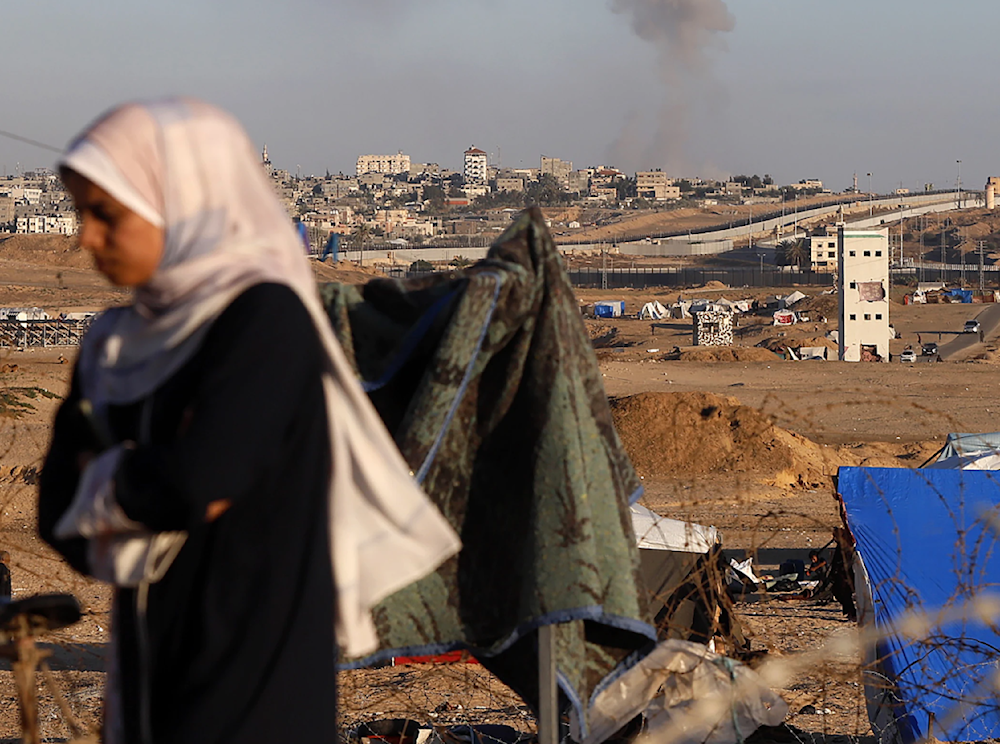Egypt blames 'Israel' for humanitarian crisis in Gaza
Israeli Foreign Minister Israel Katz stated that he had discussed with European colleagues his attempts to "persuade" Egypt to reopen the Rafah crossing following Egypt's announcement that it will not coordinate aid with "Israel" into Gaza.
-

Smoke rises following an Israeli airstrike on buildings near the separating wall between Egypt and Rafah on May 6, 2024 (AP)
An official source told the Egyptian Al Qahera news outlet that 'Israel' must withdraw from Rafah if it wishes to open the crossing, reiterating Egypt's refusal to coordinate with the Israeli occupation forces controlling the crossing.
The Israeli foreign ministry blamed Egypt on Tuesday for the oncoming humanitarian calamity in Gaza, following "Israel's" closure of the Rafah border crossing, which hampered relief delivery to the war-torn strip.
Israeli Foreign Minister Israel Katz stated that he had discussed with European colleagues his attempts to "persuade" Egypt to reopen the crossing after Egypt's state-affiliated Al Qahera News satellite TV reported on Saturday, quoting a senior official, that Egypt has refused to coordinate with "Israel" for the entry of aid into Gaza through the Rafah crossing, citing "Israel's" "unacceptable escalation."
The official further mentioned Egypt's stance regarding the war on Gaza, holding "Israel" accountable for the deteriorating situation in the Gaza Strip.
"The world places responsibility for the humanitarian situation on Israel, but the key to preventing a humanitarian crisis in Gaza is now in the hands of our Egyptian friends," Katz said on social media, adding that "Israel" will not allow Hamas to control the border.
Egyptian Foreign Minister Sameh Shoukry responded by stating that "Israel is solely responsible for the humanitarian disaster facing Palestinians in the Gaza Strip," accusing "Israel" of cutting off the remaining supply conduit.
According to the UN, "Israel" currently controls all three crossings into Gaza, something the head of the United Nations humanitarian agency, OCHA, says is "crippling aid."
A high-ranking Egyptian official informed Al Qahera that Egypt has warned the occupation about the hazards of delaying humanitarian supplies entering Gaza.
Volker Turk, the UN high commissioner for human rights, expressed over the weekend that the latest orders "affect close to a million people in Rafah. So where should they go now? There is no safe place in Gaza!"
"These exhausted, famished people, many of whom have been displaced many times already, have no good options," he stated, emphasizing that the offensive could be "catastrophic" with further atrocities anticipated.
Egyptian authorities informed The Wall Street Journal that they were thinking about reducing diplomatic relations with "Israel" and the Egyptian Foreign Ministry stated Sunday that it will intervene in the lawsuit filed by South Africa against "Israel" before the International Court of Justice (ICJ) in The Hague over the Israeli genocidal war on the Palestinian people in the Gaza Strip.
Egypt cancels meetings with Israeli officials amid Rafah invasion
An Israeli source reported that Egyptian military officials canceled all previously arranged meetings with their Israeli counterparts, according to the Israeli i24NEWS.
The website highlighted that the issue stems from Egypt's apprehensions regarding Israeli military activities along the border separating Egypt and the Gaza Strip. Furthermore, Cairo views the Israeli military's authority over the Palestinian section of the Rafah crossing as a potential violation of the longstanding treaty between the two nations, as outlined in the Camp David Accords.
The report detailed that the sudden cancellation indicates an aggravation of the crisis between the two parties, against the backdrop of Egypt's groundbreaking statement when it declared on Sunday its support for the lawsuit filed by South Africa against “Israel” in the International Court of Justice.
The decision sparked strong reactions in the occupation entity, with one source describing it to i24NEWS as “a betrayal, given previous cooperation, especially in the Sinai Peninsula.”
Before the Israeli military operation in Rafah Governorate, south of the Gaza Strip, Egypt warned of the dangers of any similar operation.
In a statement released by the Ministry of Foreign Affairs, Cairo characterized any military action in Rafah as an "escalatory act," emphasizing the significant humanitarian dangers it poses to over a million Palestinians residing in the area.
Egypt urged "Israel" to refrain from escalation "at this highly sensitive juncture in the ceasefire negotiations" and to prevent the loss of Palestinian civilian lives, who are facing an unprecedented humanitarian crisis since the onset of the war.
A few days ago, Israeli newspaper Maariv confirmed that Egyptian officials informed the Director of American Intelligence, William Burns, that the United States must exert serious pressure on "Israel" to stop its operation in the city of Rafah and return to serious negotiations.

 4 Min Read
4 Min Read










